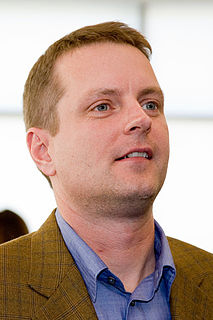A Quote by Jeff Bezos
One of the things that I hope will distinguish Amazon.com is that we continue to be a company that defies easy analogy. This requires a lot of innovation, and innovation requires a lot of random walk.
Quote Topics
Related Quotes
Innovation is a subset of creativity. Innovation often deals with product launches and is often relegated to the C-suite or to heads of R&D departments. Innovation requires creativity, but creativity is something that is much more broad. It applies to people at all levels of an organization. Today, we all are responsible for delivering "everyday creativity". Small creative acts that add up to big things.
Implementing any major changes to the way companies operate requires time and determination and the shift to globally integrated innovation is no exception - it calls for new capabilities to be built, changes in the structure of the innovation organization, new systems, processes and mindsets. The scope and scale of this task shouldn't prevent executives from starting down the path of change as the systemic nature of innovation activities means that every single element of change that's brought about will make a difference.
To most observers, innovation is a solitary process that requires creativity and genius, perhaps even greatness. It can't, in their view, be managed or predicted, just hoped for and, perhaps, facilitated. But for me innovation was and still is more than that. It was a battle in the marketplace between innovators or attackers trying to make money by changing the order of things, and defenders protecting their cash flow.
Innovation requires us to systematically identify changes that have already occurred in a business - in demographics, in values, in technology or science - and then to look at them as opportunities. It also requires something that is most difficult for existing companies to do: to abandon rather than defend yesterday.
Creativity and innovation are something you can’t flowchart out. Some things you can, and we do, and we’re very disciplined in those areas. But creativity isn’t one of those. A lot of companies have innovation departments, and this is always a sign that something is wrong when you have a VP of innovation or something. You know, put a for-sale sign on the door.































